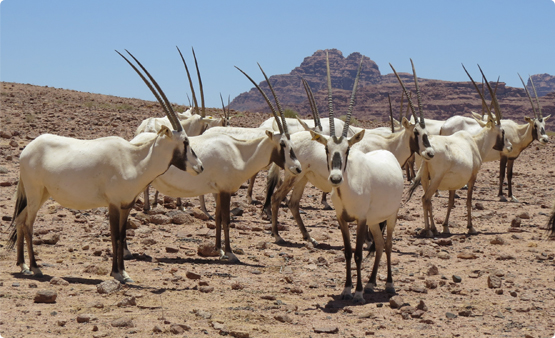


Cart is empty. Please go to your home page for listing it.

The Royal Society for the Conservation of Nature (RSCN) is a realization of these young hunters’ pioneering vision to protect and conserve Jordan’s nature; despite the limitations, such actions would inevitably place on their favorite pastime. What began in 1966 as a small society comprised of a few dedicated and inspired individuals, has now evolved itself into a locally, regionally, and internationally recognized environmental organization that is integral to the conservation of nature in Jordan.
In order to reverse the existing damage done to Jordan’s precious wildlife, RSCN instigated efforts to replenish the numbers of endangered species, which had been brought to the edge of extinction locally due to indiscriminate hunting, with its introduction of captive breeding programs (link to Shaumari page).
Due to the core need for a fundamental change in people’s attitudes and behaviors towards nature, RSCN has focused on helping to create future generations of more environmentally conscious and concerned individuals through environmental education programs. In 1986, RSCN started its first Nature Conservation Clubs in schools to help children understand the significance of certain environmental issues, while getting them actively involved in conservation projects. Today, there are over 1000 Nature Conservation Clubs throughout the Kingdom, which are operated by a network of club leaders who are trained in exciting and innovative methods of environmental education. To spread further awareness, RSCN has also cooperated with the Ministry of Education to include several key conservation concepts within the national curriculum, while providing educational programs in the reserves.
RSCN embarked on a new path to nature conservation in an effort to improve the quality of life of local communities located in and around protected areas and maintain their support for conservation. In 1994, RSCN entered a new era of nature conservation with its establishment of Dana Biosphere Reserve as a model of integrated conservation and socio-economic development, aiming to meet the needs of both nature and people. By initiating nature-based businesses of handicrafts and organic foods production, RSCN created jobs for local community members, providing improved livelihoods for poor rural communities. Furthermore, through the establishment of eco-tourism programs, locals began to benefit from protecting the integrity of their naturally beautiful environment, thus increasing their appreciation and support for conservation efforts.
Building on the success of the Dana initiative, Wild Jordan was created as the business arm of RSCN to develop similar socio-economic programs in all of Jordan's nature reserves. Wild Jordan now manages innovative income generating programs that build on locally available skills and products and on the tourism potential of the nature reserves.
After years of conservation work, RSCN is confident of its ability to transfer its acquired knowledge to similar nature protection entities in the Arab world that sought to learn from its rich and fruitful experience. Thus, in 1999, RSCN began its first regional training program, providing training and capacity building to environmental practitioners and other institutions throughout Jordan and the Middle East in an attempt to empower others in their efforts to protect the environment.
RSCN first recognized the substantial power of a people united in 2005, when it launched “Save Jordan’s Trees” Campaign hand-in-hand with several other environmental agencies and a group of volunteers from various sectors, successfully blocking the government’s proposal to amend the agricultural law of 2005.
RSCNs membership program stems from the time of the original founders of RSCN, who were dedicated volunteers striving to affect change in any way they could because they believed in people’s ability to make a difference. Holding firmly to this faith, RSCN continues to invite all individuals who are invested in wildlife and environmental conservation to become voices for nature, protecting that which cannot protect itself.
RSCN has long realized the necessity for remaining a strong and dynamic institution, capable of responding to increasing demands and responsibilities, in order to effectively and efficiently fulfill its role in protecting and caring for Jordan’s biodiversity. Its future is built on the continued determination of its staff and stakeholders, who strongly believe in each individual’s ability to create change through hard work and commitment to a solid vision.